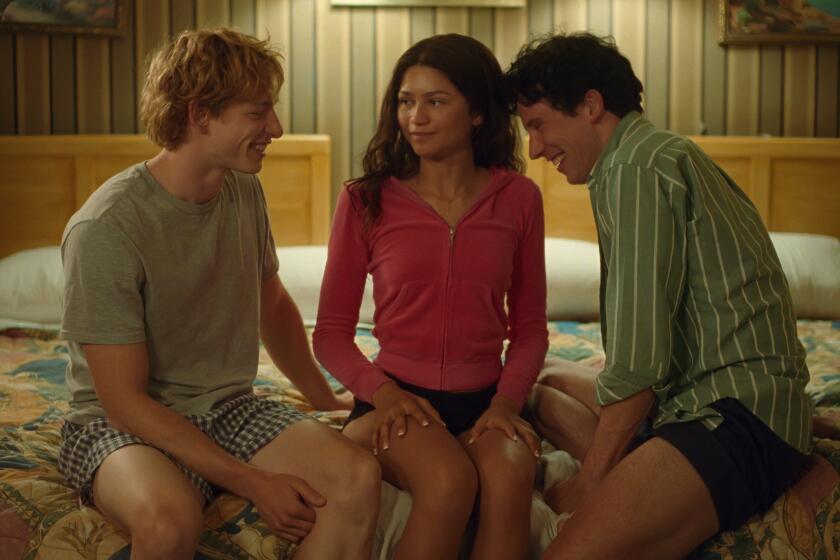Oscar Watcher’s Notebook: The zeitgeist edge
Who doesn’t want to be relevant? It’s a step toward contentment, a way to stay charged and, in this season, a key to predicting the Oscars.
FOR THE RECORD:
Oscar voting: The Oscar Watcher’s Notebook in the Nov. 11 edition of The Envelope about factors that might sway votes for best picture said the film “The Apartment” was released in 1959. It opened in 1960. —
Sometimes Oscar voters pick pure entertainments for best picture (“The Departed,” “No Country for Old Men”), but that’s rare. Usually, they want their champs to have an urgent social message that they can embrace.
And that’s where “The Social Network” has a leg up on some of its competitors: It reflects the national zeitgeist during this Age of Facebook.
“The Kids Are All Right” also offers a healthy dose of social relevance because it says something profound about the changing definition of the American family. And looked at a certain way, “127 Hours” might also count in that it has a painful moral lesson for cocky modern fitness freaks.
One of the reasons “The Hurt Locker” triumphed last year was because it enabled academy members to feel firsthand the terror of U.S. soldiers fighting in Iraq and Afghanistan. But it was packed with another, explosive message too: We are now, as a nation, much more willing to face our unpopular wars early on. “The Deer Hunter” (1978) and “Platoon” (1986) were made and won their awards years after the fall of Saigon.
Some Oscar best pictures focused on racial conflict: “In the Heat of the Night” (1967) and “Crash” (2006). Others addressed the sexual revolution and the dating scene in America: “The Apartment” (1959) and “Annie Hall” (1977). The cracks in the traditional American family were explored in “Kramer vs. Kramer” (1979), “Ordinary People” (1980) and “American Beauty” (1999).
It’s surprising that Watergate drama “All the President’s Men” (1976) lost best picture just two years after Richard Nixon’s resignation, but the film was released during America’s bicentennial celebration. Oscar voters likely wanted to move on, preferring the zeitgeist reflected in the positive, inspiring fable of an average Joe getting his shot at the world heavyweight boxing championship in “Rocky.”
So while “The Social Network” seems to have an edge, what might future Oscar historians say about it and the other current derby rivals for best picture? Five top contenders have a requisite modern message:
“The Social Network”: Exposé of our modern media revolution as sham. As we witness the birth of social networking in this film, nowhere are there high-minded dreamers pressing on to discover new cyber-frontiers. Just college kids trying to gain status and jump in the sack while double-crossing each other. Some Oscar cynics say forget this flick connecting with academy veterans who aren’t computer savvy, but that’s a cliché dismissal that’s no longer true. Some academy members were reprimanded by academy chiefs last year for appearing to campaign for Oscars — on Facebook.
Come to think of it, “The Social Network” may even have special appeal to academy members. While watching the computer geeks turn on each other, how can voters not think of what goes on every day in cutthroat Hollywood?
“Toy Story 3”: The story doesn’t have a profound modern message, but its production does. Computer animation is cutting-edge movie-making and hugely profitable ($413 million domestic, $1 billion worldwide for “Toy Story 3”). Oscar voters can not only feel hip by voting for it, but can also give a heartfelt salute to their lost childhood.
“The Kids Are All Right”: For decades, voters have been eagerly embracing straight actors who play gay: Tom Hanks (“ Philadelphia”), Nicole Kidman (“The Hours”), Charlize Theron (“Monster”), Sean Penn ( “Milk”). Now they can hug a gay household headed by Oscarless Annette Bening and Julianne Moore while sending a social message that this is a legit family too.
“Black Swan”: It’s an updated, sexier “All About Eve” (best picture winner of 1950), which even includes a lesbian scene plus fantasy elements made believable by clever modern graphics.
“127 Hours”: The cocky young yahoos in “The Social Network” get rich as a result of their hubris. In “127 Hours,” one man pays a serious price when he gets caught between a rock and a hard place.
More to Read
The biggest entertainment stories
Get our big stories about Hollywood, film, television, music, arts, culture and more right in your inbox as soon as they publish.
You may occasionally receive promotional content from the Los Angeles Times.










